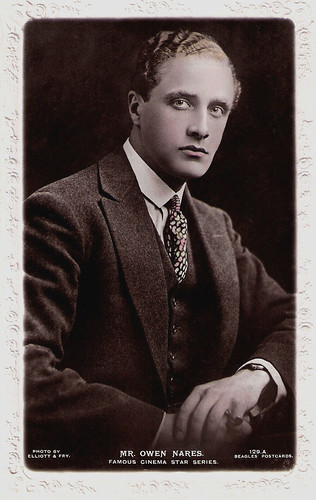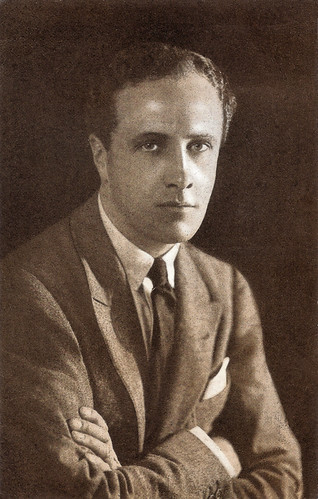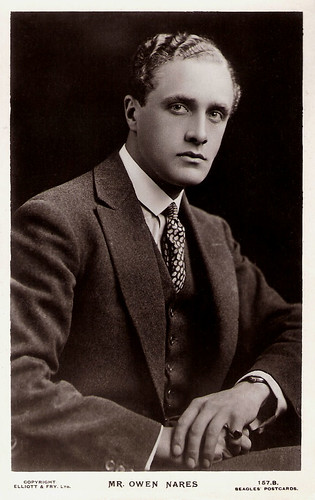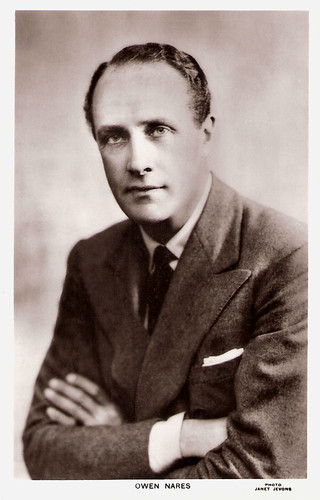British actor Owen Nares (1888-1943) was the heartthrob actor of his generation, both in films and on stage in the West End. The late 1910s and early 1920s were his golden period and he romanced such British film stars as Isobel Elsom and Lilian Hall-Davis. During the 1930s, he became a character actor. Besides his acting career, he was the author of 'Myself, and Some Others' (1925).

British postcard in the Famous Cinema Star Series by J. Beagles & Co., London. Photo: Elliott & Fry.

British or American postcard. Signed with an autograph.

British postcard by Beagles Postcards in the Famous Cinema Star series, no. 129B. Photo: Elliott and Fry.
Owen Ramsay Nares was born in Maiden Erlegh, England, in 1888. He was educated at Reading School. Nares was encouraged by his mother to become an actor, and in 1908, he received his training from actress Rosina Filippi. The following year, he was playing bit parts in West End productions.
Blessed with good looks and a debonair manner, his reputation as a matinee idol grew in the following years. In 1915, he played Thomas Armstrong in Edward Sheldon's Romance at the Lyric Theatre, and in 1917, he starred with Lily Elsie at the Palace Theatre in the musical comedy Pamela.
His delicate health strengthened the romanticism that surrounded him. The silent production His Choice (Hubert von Herkomer, 1913) was the first of the 25 silent films in which Nares appeared. His film debut was followed by Danny Donovan, the Gentleman Cracksman (Walter Waller, 1914) with Thomas Meighan and Gladys Cooper, the drama Milestones (Thomas Bentley, 1916) with Isobel Elsom, the romance Just a Girl (Alexander Butler, 1916) featuring Daisy Burrell, and The Labour Leader (Thomas Bentley, 1917) with Fay Compton.
During the early 1920s, he acted as the handsome male lead opposite such popular film actresses as Isobel Elsom in the romantic drama For Her Father's Sake (Alexander Butler, 1921) and Lillian Hall-Davis in the romance Brown Sugar (Fred Paul, 1922) and in The Faithful Heart (Fred Paul, 1922).
His stage career also continued to flourish. He appeared opposite Meggie Albanesi in 'The First and the Last' for a long run during the 1920s. Nares continued to star in popular West End shows, almost without pause, until 1926, when he then took a break and set off with his own company for a tour of South Africa.

British postcard by John Waddington Ltd., Leeds / London. Photo: publicity still for the stage production of Diplomacy in the New Theatre, Cardiff. Sent by mail in 1924.

British postcard by S.C. Allen & Company, Ltd., Belfast and London for Wyndham's Theatre, London. Photo: publicity still for the play The Calendar (1931) with Gordon Harker, Alfred Drayton and Owen Nares.

British postcard in the Famous Cinema Star Series by J. Beagles & Co., London. Photo: Elliott & Fry.
With the advent of sound film, Owen Nares’ considerable stage experience kept him in high demand, and he starred in several early sound films. The first was the comedy The Middle Watch (Norman Walker, 1930) with Jacqueline Logan. It was made by British International Pictures at its Elstree Studios.
He appeared with Edna Best in the crime-drama Loose Ends (Norman Walker, 1930). A big hit was the musical Sunshine Susie (Victor Saville, 1931) starring Renate Müller, Jack Hulbert and Nares. The film established Müller as a star in Britain. An alternate German-language version, Die Privatsekretärin, was made, also starring Renate Müller but without Nares.
The Impassive Footman (Basil Dean, 1932) was a low-budget ‘quota quickie’ in which he co-starred with Betty Stockfeld. This drama was made at Ealing Studios and was also released under the alternative title Woman in Bondage. Nares co-starred with Winifred Shotter in the musical The Love Contract (Herbert Selpin, 1932). He appeared opposite Jessie Matthews in the comedy There Goes the Bride (Albert de Courville, 1932). He was, however, too mature to be the handsome star he had been a decade earlier.
In the last six films he made, he played supporting roles. Remarkable is the comedy-drama The Private Life of Don Juan (Alexander Korda, 1934) starring Douglas Fairbanks in his final film role as the ageing Don Juan. In the musical The Show Goes On (Basil Dean, 1937), he was the co-star of Gracie Fields. His final film was The Prime Minister (Thorold Dickinson, 1941) about the life and times of novelist Benjamin Disraeli (John Gielgud), who became Prime Minister of the United Kingdom.
In 1942, Nares appeared in a revival of Robert E. Sherwood’s 'The Petrified Forrest', and afterwards he went on tour with the play to Northern England and Wales. During a tour through Wales in 1943, he visited Brecon, the birthplace of actress Sarah Siddons. While he was in the very room where Siddons had been born, Nares had a heart attack and died shortly afterwards in 1943. He was 54. Since 1910, Owen Nares had been married to Anglo-Italian actress Marie Pollini. The couple had two sons, David and Geoffrey Nares. During the war, Geoffrey died in Egypt in 1942.

British postcard in the Cinema Chat series. Photo: Elliott and Fry.

British postcard by Beagles & Co., no. 157e. Photo: Reville Studios.

British postcard in the Picturegoer Series, London, no. 84. Photo: Foolsham & Banfield.

British postcard in the Picturegoer Series, London, no. 84c. Photo: Janet Jevons.
Sources: Bridget Clarke (St. John’s Wood Memories), Thomas Staedeli (Cyranos), AllMovie (Page now defunct), Wikipedia, and IMDb.
This post was last updated on 6 December 2025.

British postcard in the Famous Cinema Star Series by J. Beagles & Co., London. Photo: Elliott & Fry.

British or American postcard. Signed with an autograph.

British postcard by Beagles Postcards in the Famous Cinema Star series, no. 129B. Photo: Elliott and Fry.
Blessed with good looks and a debonair manner
Owen Ramsay Nares was born in Maiden Erlegh, England, in 1888. He was educated at Reading School. Nares was encouraged by his mother to become an actor, and in 1908, he received his training from actress Rosina Filippi. The following year, he was playing bit parts in West End productions.
Blessed with good looks and a debonair manner, his reputation as a matinee idol grew in the following years. In 1915, he played Thomas Armstrong in Edward Sheldon's Romance at the Lyric Theatre, and in 1917, he starred with Lily Elsie at the Palace Theatre in the musical comedy Pamela.
His delicate health strengthened the romanticism that surrounded him. The silent production His Choice (Hubert von Herkomer, 1913) was the first of the 25 silent films in which Nares appeared. His film debut was followed by Danny Donovan, the Gentleman Cracksman (Walter Waller, 1914) with Thomas Meighan and Gladys Cooper, the drama Milestones (Thomas Bentley, 1916) with Isobel Elsom, the romance Just a Girl (Alexander Butler, 1916) featuring Daisy Burrell, and The Labour Leader (Thomas Bentley, 1917) with Fay Compton.
During the early 1920s, he acted as the handsome male lead opposite such popular film actresses as Isobel Elsom in the romantic drama For Her Father's Sake (Alexander Butler, 1921) and Lillian Hall-Davis in the romance Brown Sugar (Fred Paul, 1922) and in The Faithful Heart (Fred Paul, 1922).
His stage career also continued to flourish. He appeared opposite Meggie Albanesi in 'The First and the Last' for a long run during the 1920s. Nares continued to star in popular West End shows, almost without pause, until 1926, when he then took a break and set off with his own company for a tour of South Africa.

British postcard by John Waddington Ltd., Leeds / London. Photo: publicity still for the stage production of Diplomacy in the New Theatre, Cardiff. Sent by mail in 1924.

British postcard by S.C. Allen & Company, Ltd., Belfast and London for Wyndham's Theatre, London. Photo: publicity still for the play The Calendar (1931) with Gordon Harker, Alfred Drayton and Owen Nares.

British postcard in the Famous Cinema Star Series by J. Beagles & Co., London. Photo: Elliott & Fry.
Still much in demand
With the advent of sound film, Owen Nares’ considerable stage experience kept him in high demand, and he starred in several early sound films. The first was the comedy The Middle Watch (Norman Walker, 1930) with Jacqueline Logan. It was made by British International Pictures at its Elstree Studios.
He appeared with Edna Best in the crime-drama Loose Ends (Norman Walker, 1930). A big hit was the musical Sunshine Susie (Victor Saville, 1931) starring Renate Müller, Jack Hulbert and Nares. The film established Müller as a star in Britain. An alternate German-language version, Die Privatsekretärin, was made, also starring Renate Müller but without Nares.
The Impassive Footman (Basil Dean, 1932) was a low-budget ‘quota quickie’ in which he co-starred with Betty Stockfeld. This drama was made at Ealing Studios and was also released under the alternative title Woman in Bondage. Nares co-starred with Winifred Shotter in the musical The Love Contract (Herbert Selpin, 1932). He appeared opposite Jessie Matthews in the comedy There Goes the Bride (Albert de Courville, 1932). He was, however, too mature to be the handsome star he had been a decade earlier.
In the last six films he made, he played supporting roles. Remarkable is the comedy-drama The Private Life of Don Juan (Alexander Korda, 1934) starring Douglas Fairbanks in his final film role as the ageing Don Juan. In the musical The Show Goes On (Basil Dean, 1937), he was the co-star of Gracie Fields. His final film was The Prime Minister (Thorold Dickinson, 1941) about the life and times of novelist Benjamin Disraeli (John Gielgud), who became Prime Minister of the United Kingdom.
In 1942, Nares appeared in a revival of Robert E. Sherwood’s 'The Petrified Forrest', and afterwards he went on tour with the play to Northern England and Wales. During a tour through Wales in 1943, he visited Brecon, the birthplace of actress Sarah Siddons. While he was in the very room where Siddons had been born, Nares had a heart attack and died shortly afterwards in 1943. He was 54. Since 1910, Owen Nares had been married to Anglo-Italian actress Marie Pollini. The couple had two sons, David and Geoffrey Nares. During the war, Geoffrey died in Egypt in 1942.

British postcard in the Cinema Chat series. Photo: Elliott and Fry.

British postcard by Beagles & Co., no. 157e. Photo: Reville Studios.

British postcard in the Picturegoer Series, London, no. 84. Photo: Foolsham & Banfield.

British postcard in the Picturegoer Series, London, no. 84c. Photo: Janet Jevons.
Sources: Bridget Clarke (St. John’s Wood Memories), Thomas Staedeli (Cyranos), AllMovie (Page now defunct), Wikipedia, and IMDb.
This post was last updated on 6 December 2025.
No comments:
Post a Comment